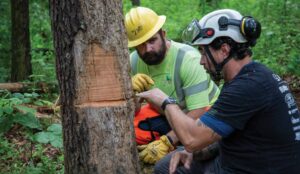Electric cooperatives own and maintain 2.7 million miles of distribution lines in the U.S., according to the National Rural Electric Cooperative Association. Men and women across the nation dedicate their lives to keep the lights on, rain or shine. For some families, power lines run through their veins.
The Johnson family
“We grew up in a bucket truck,” says Luke Johnson, a second-generation lineman and CEO at Clay Electric Co-operative. That goes for his children too. His father, brother and eldest son are also lineworkers.
Dave, the family patriarch, began his linework career with a contractor in Fairfield following his service as a communications electrician in the Navy. Five years later, in 1984, he was hired at Clay Electric.
“Growing up, we always helped Dad with electrical projects … well, we probably got in his way more than anything,” Luke recalls. At home, Dave would take his sons up in the bucket truck to look out. “Getting to experience that was always exciting.”
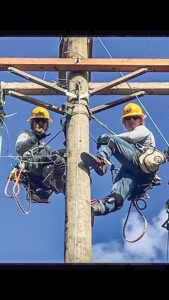 Grant Johnson (right) wanted to be a lineman ever since he was a kid. He is now a third-generation lineworker.
Grant Johnson (right) wanted to be a lineman ever since he was a kid. He is now a third-generation lineworker.  Grant Johnson wanted to be a lineman ever since he was a kid. He is now a third-generation lineworker.
Grant Johnson wanted to be a lineman ever since he was a kid. He is now a third-generation lineworker. 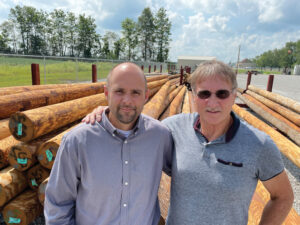 Luke Johnson photographed with his dad Dave. Both men were lineworkers for Clay Electric Co-operative. Luke is now the co-op’s CEO and Dave is retired.
Luke Johnson photographed with his dad Dave. Both men were lineworkers for Clay Electric Co-operative. Luke is now the co-op’s CEO and Dave is retired. Luke and his brother Lee were constantly around linework, whether it was answering calls about outages or watching their dad work. Dave remembers a time he was called for an outage while home alone with Luke, who was sick. Dave loaded him in the truck and took him along. “He got rewarded by going to Dairy Queen,” Dave laughs.
“Living at home, when Dad would get called out, the phone would ring in the middle of the night,” Luke remembers. “You’d be on the phone with your friends or girlfriend and if you heard that beep, you better answer it … it was always for an outage.”
Dave was the last lineman Clay Electric had hired in 15 years until he left to work for neighboring co-op Wayne-White Counties Electric Cooperative in 1999. Ten days later, Luke replaced him to become Clay’s newest apprentice lineman.
At that time, Dave’s eldest son Lee was working for Corn Belt Energy as an apprentice lineman. “I was glad for them,” Dave says about both sons getting into linework. “They picked it on their own. They knew what to expect and how it worked.”
“I always wanted to be a lineman,” Luke says, who had been working for a heating and air sheet metal contractor at the time. “There weren’t many retirements back then, so after he resigned, I just came down and basically begged for a job.”
In 2015, Luke was promoted to operations manager, and was appointed CEO of Clay Electric in January 2019 after acting as interim CEO when the manager left in 2018.
Now that Dave is retired and Luke is no longer on the line crew, one thing they miss most about the job is working storms.
“Storms are a blast,” Luke says, calling it an adrenaline rush. “I really enjoyed hurricanes and ice storms. It was neat to get out and help people.”
“There is an element of daredevil to you,” Dave agrees. “It gives you a bit of a rush.”
A couple of benefits to being part of a linework family are the years of experience and advice passed on.
“I know the women in our family get tired of it, but when you get us together, we have something in common to talk about,” Dave says.
Luke agrees. “We have always had support with all of us being in it. We bounce ideas off each other and hash things out.”
At age 19, Luke’s eldest son Grant has started his career as a lineman at CenterPoint Energy in Terre Haute, Ind., alongside his uncle. Right out of high school, he went to line school at Southeast Lineman Training Center in Georgia and was hired as an apprentice lineman in February 2021.
“I’ve been around linework my whole life,” Grant says. “I knew what I wanted to do since I was young.”
He fell in love with the excitement of the profession. As a kid, when a storm would hit, his mother would take him and his siblings out to the work site to deliver food and watch the buckets in the air where his father was working to restore power. Grant remembers a 2011 ice storm in Flora when he got to watch both his father and grandfather in action.
Now that he’s a lineman, Grant can now participate in line talk with his family. “They still school me every time we talk,” he says. “It is neat to understand what they’re talking about. … The stuff Dad used to tell me is now starting to click.”
After nearly 34 years as a co-op lineworker, Dave retired in 2018. “I miss it, but I don’t dwell on it,” he says. “There’s just a time when your body can’t take it anymore. … God has blessed me in so many ways I can’t even count.”
“If I had to go back to doing linework, I’d do it tomorrow,” Luke adds. “But I like where I’m at and making a difference here too as CEO. Feeling accomplished is my goal in life.”
As for Grant, he believes he made the right choice to become a lineman and looks forward to a long career. “My family taught me a lot,” Grant says. “It is cool to hear stories about what they did when they were linemen. I can’t say enough good things about those guys.”
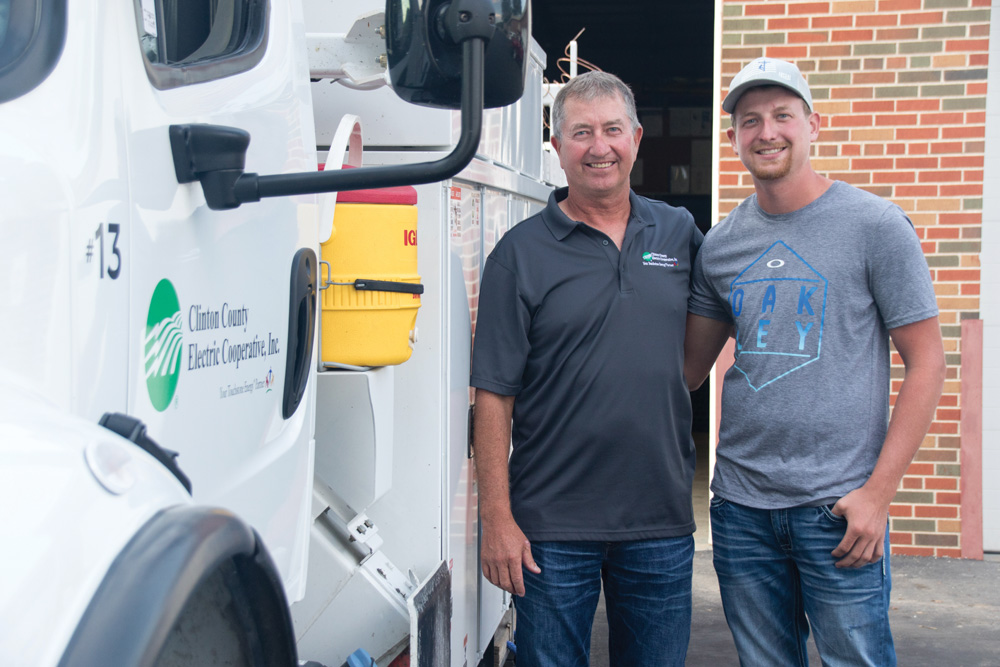
The Vonder Haar family
For Doug Vonder Haar and his son Jordan, interest in linework happened similarly … just years apart.
Doug grew up on a dairy farm on Clinton County Electric Cooperative (CCEC) lines. When he was younger and living with his parents, he was working outdoors. “The co-op was rebuilding a line on my dad’s farm,” he recalls. “I thought it was interesting seeing how they did it. That piqued my interest in linework.”
Years later, Doug was part of the CCEC crew rebuilding line on his own farm, and Jordan watched. “He’s my biggest influence,” Jordan says about deciding to become a lineman. “When they rebuilt that line by our house, I was outside watching. I was simply amazed.”
Doug has now been with CCEC for 31 years, starting as an apprentice in 1990 and working his way to journeyman lineman. Jordan works as an apprentice lineman for the city of Breese and has been there two years.
The summer before his senior year of high school, Jordan got a taste of what it was like working with linemen when CCEC hired him for extra help. This gave him the opportunity to see the job up close and learn lineman slang.
“That was a big learning point,” Jordan says. “That’s how I knew for sure I wanted to be a lineman.”
After graduating high school in 2018, he went to the North American Lineman Training Center in Tennessee and found his current job 5 minutes away from his family’s farm.
“Almost every day when we get home from work, we talk about job stuff. It is kind of neat,” Doug says. “Every once in a while, we will meet each other in the hall going to outages in the middle of the night.”
Although Doug is no longer on the line crew, having recently been promoted to leadman, he still gives Jordan advice about the job.
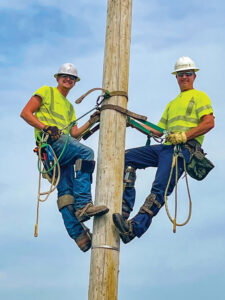
“You learn from your peers,” Doug says. “Me being the old guy, I try to pass on any knowledge I can. You always want to try to teach the young guys anything you know to keep them safe. I want them to get home to their families.”
Doug says safety and training has changed a lot over the three decades he’s been a lineman. For one, line school didn’t exist when Doug started.
“The way we did things 30 years ago isn’t the same as we do today,” Doug says. “When linework [first began], the death rate was bad. There were no rules and no safety. I’ve been trained a lot, and Jordan is going through training. With this job, safety is a big thing.”
Doug adds that he has learned just as much talking to other lineworkers as taking safety courses. “You learn stuff from just talking to each other. It is a big brotherhood.”
Now that Jordan has joined that brotherhood, Doug couldn’t be happier.
“I was very proud and excited that he was willing to take a chance,” Doug says. “Knowing that he had such an interest in it, I knew he’d do well.”
Jordan says he 100 percent made the right decision to get into linework. “I like everything about it, and it makes for a nice living.”
What he likes most is helping people. “You really feel appreciated when you’re driving down the road after you’ve just turned the last line on and people are outside saying, ‘Thank you,’” Jordan says.
“Storm recovery is rewarding, especially after a major outage,” Doug agrees. “When you work all night, and you get that last line on … you know people are waiting for their power to come back on. It makes you feel good.”
For those interested in getting into linework, here’s Jordan’s advice. “Put all effort into it. Show that you care. Show that you can work hard. Put a good line out for yourself.”
Bernice, Doug’s wife and Jordan’s mother, adds how important it is to be safe.
“I worry a lot,” Bernice says. “First, I was a wife of a lineman, and now I’m a wife and mother of linemen. OK guys, I don’t need sleep at all. … I have a husband and a son out there in storms and they’re surrounded by lightning. It puts a toll on you. When they both come home safe, I thank God.”
“In my 30 years, I’ve seen some stuff happen. Sometimes things don’t go to plan, and sometimes you’re more lucky than good,” Doug says. “With all the safety we’ve been taught over the years, it definitely has helped me think more about safety.”
“I can’t stress enough, be careful,” Bernice says.
“I get that every time I leave in the morning,” Jordan smiles.
“She’s been saying that for 31 years,” Doug adds.

The Schafer family
“I’m putting hands on a pole coming out of the ground that Dad put in the ground 40 years ago,” says Bob Schafer, line foreman at Coles-Moultrie Electric Cooperative (CMEC). “It is a neat thing. I don’t think a lot of people have the opportunity to do the same things literally in the same places that their dad did.”
His dad Thom started working for CMEC in 1978 and retired in 2011. Half of that time was in the line department and the other half in engineering. He started as a groundman, worked his way to apprentice and then to journeyman lineman.
After Thom left the U.S. Air Force and moved back to the area to be with his girlfriend, who is now his wife, he attended Lake Land Community College. He got into linework because a college friend suggested he apply to work with him at the local electric co-op.
“I wanted the title of a journeyman lineman. I didn’t care about anything else. I wanted to be a journeyman lineman,” Thom says. “Two reasons, I loved doing linework and the smug factor. There aren’t many linemen, and not everybody wants to be out there doing the job.”
Thom remembers times being away from home due to power restoration after severe weather. “When everything was done, I’d have two sets of brown eyes when I got home looking at me and running through the house screaming, ‘Daddy’s home!’ It was pretty cool.”
“I grew up in these buildings,” Bob remembers. “My mom would bring my brother and me by in the evenings when Dad was getting off work. Now, the minute I walk into the warehouse, the smell of all that hydraulic oil and diesel exhaust jogs me back to when I was a little kid.”
After a small stint in high school as summer help for the co-op, Bob earned a bachelor’s degree from Ohio State University. He worked five years for an engineering firm in Columbus, Ohio, doing line design. “I didn’t like being in an office,” Bob says. “I spent a lot of time outside, but it wasn’t enough.”
He got a call from Thom telling him a warehouse job was open at CMEC. He was hired in 2010 and moved back home. Once there, he moved on to the tree crew, became an apprentice lineman and was later promoted to journeyman lineman.
“Growing up around it, [linework] somehow never took when I was a kid,” Bob says. “I understood what he did, but I didn’t really know the nuts and bolts of it. It is complex and yet it isn’t rocket science. There are things behind the scenes that people don’t see involved in linework and it intrigued me. After working the engineering job and realizing I couldn’t work in an office or wear a suit, I decided this was what I needed to do.”
“I was disappointed he didn’t start four years before that, to be perfectly honest with you,” Thom jokes. “I’m glad he got his degree. I am proud of him. I knew he’d be able to do this because he’s had experience in the engineering side. He’s always been mechanically inclined. He’s always been good with his hands. I was 100 percent behind it.”
For a while, Bob lived at home until he found a place of his own, so the father and son carpooled to and from work. Bob used the commute to his advantage by bouncing questions off his dad. “It was a great opportunity to pick his brain without having to be the guy new on the job always running back and forth asking questions.”
“It was nice to be able to drive and talk,” Thom says. “I’ve been really close with both my boys. In our house, we could talk about everything.”
Both men agree that restoring power after an outage is a highlight to being a lineworker.
Thom says it was especially satisfying to restore power to the co-op’s charter members – the ones who signed up to become a member of CMEC in 1939. “When the power is out, it is cold and you throw the switch … the lights come on and you see them in the windows waving at you or coming out to thank you,” Thom says. “We in the cooperative business, we are kind of different. That’s what I like the most … the true idea of the cooperative spirit.”
“I have to agree with that,” Bob says. “I’ve worked a lot of jobs, but I’ve never had the job satisfaction like turning someone’s lights back on in the middle of the night.”
The Schafers also agree that working for an electric co-op is much more than a job; it is a family. When a milestone, like the birth of a baby, is being celebrated, the whole co-op celebrates. When a fellow lineman is working in the air, you keep an eye out for your brother.
“I can honestly tell you when I retired after almost 33 years, I looked forward to coming to work every day,” Thom says. “It is that good of a place.”
“That family dynamic really separates co-ops in the industry,” Bob says. “I still look forward to coming to work every day.”






